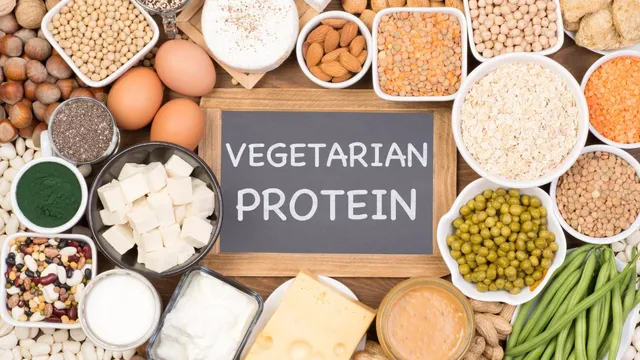- By Prerna Targhotra
- Tue, 01 Oct 2024 06:03 PM (IST)
- Source:JND
Best Vegetarian Diet For Weight Loss: In recent years, plant-based diets have gained significant attention for their health benefits. Vegetarian diets have long been celebrated for their diversity, offering a wealth of options that can cater to different nutritional needs. One common concern among those looking to adopt or maintain a vegetarian diet is ensuring adequate protein intake, particularly when weight loss is your goal.
Proteins are essential macronutrients required for muscle repair, enzyme production, and overall metabolic function. While animal-based foods are typically rich in protein, several vegetarian sources can fulfil daily protein requirements effectively. Contrary to popular belief, a well-planned vegetarian diet can provide all the necessary proteins for those pursuing fitness or weight loss goals.
We are fortunate to have a wide array of vegetarian foods that are protein-rich, from lentils (dal) to dairy products like paneer and yoghurt. The key to a successful vegetarian diet that supports both high protein intake and weight loss lies in choosing the right foods, balancing macronutrients, and maintaining portion control.
In a conversation with Jagran English, Dr Shuchi Sharma, Chief Dietician, Sahyadri Super Speciality Hospital, Nagar Road, Pune listed the best vegetarian diet one can consume for maximum protein intake and quick weight loss.
Top Vegetarian Protein Sources
1. Lentils and Legumes (Dal) - Lentils such as masoor dal, toor dal, and moong dal are excellent protein sources. A single serving (1 cup cooked) of lentils can provide up to 18 grams of protein. Legumes like chickpeas (chana), kidney beans (rajma), and black gram (urad dal) are equally potent in protein content.
2. Paneer (Indian Cottage Cheese) - Paneer is a powerhouse of protein, providing about 14 grams of protein per 100 grams. It’s a versatile ingredient that can be incorporated into various dishes, such as paneer bhurji, grilled paneer, or paneer tikka, without adding excessive calories.
3. Quinoa and Millets - Quinoa is one of the few plant-based sources that offer complete proteins, meaning it contains all nine essential amino acids. With approximately 8 grams of protein per cup, it’s an excellent substitute for rice or roti. Millets like ragi and jowar also offer good amounts of protein while being low in calories.
4. Nuts and Seeds - Almonds, chia seeds, flaxseeds, and pumpkin seeds are all rich in protein. They also offer healthy fats, which are important for satiety during weight loss. For example, a handful of almonds provides about 6 grams of protein.
5. Soy Products (Tofu, Tempeh, and Soy Milk) - Tofu and tempeh are fantastic sources of plant-based proteins, with tofu providing approximately 10 grams of protein per 100 grams. These soy products are highly versatile and can be grilled, stir-fried, or added to curries.
6. Greek Yogurt and Low-fat Dahi - Greek yoghurt provides around 10 grams of protein per 100 grams, making it a fantastic option for those seeking low-calorie, high-protein meals. Traditional Indian dahi is also beneficial, though slightly lower in protein.
-1727785462211.jpg)
Best Protein-Rich Vegetarian Foods (Image Credits: Canva)
Tips For Optimising Protein Intake
1. Portion Control - While increasing protein intake, it’s essential to monitor portion sizes, particularly with higher-calorie foods like nuts and seeds. Keeping portions moderate can ensure you stay within your calorie target for weight loss.
2. Combine Proteins for Complete Amino Acid Profiles - Since plant proteins are often incomplete (missing one or more essential amino acids), combining different sources such as lentils with rice or wheat with legumes can help you get a complete amino acid profile.
3. Stay Hydrated - Protein metabolism can increase the demand for hydration. Drinking plenty of water also supports digestion and fat loss by flushing out toxins.
4. Include Fiber-Rich Foods - Fiber helps you feel fuller for longer, making it easier to stick to your diet. Foods like green vegetables, oats, and fruits add fibre and keep your digestive system healthy, contributing to weight loss.
5. Regular Physical Activity - A balanced diet works best when combined with regular exercise. Aim for at least 30 minutes of moderate physical activity daily, whether it's walking, yoga, or strength training.
Misconceptions About Vegetarian Diets And Protein Intake
Dr Sharma says that one of the most widespread misconceptions about vegetarian diets is that they are inherently low in protein. While it’s true that plant-based protein sources tend to be lower in protein density compared to animal products, careful planning ensures that vegetarians can meet or even exceed their protein needs.
Another myth is that vegetarian diets are carb-heavy, making weight loss difficult. In reality, combining protein-rich foods with fibre can aid in weight management and fat loss. A vegetarian diet can offer sufficient protein for muscle growth, metabolism, and overall health while supporting weight loss goals.
ALSO READ: Try These Healthy Food Combinations To Lose Weight Quickly And Get Desired Body
ALSO READ: 5 Healthy Protein Alternatives To Add To Your Vegetarian Diet For Muscle Growth

